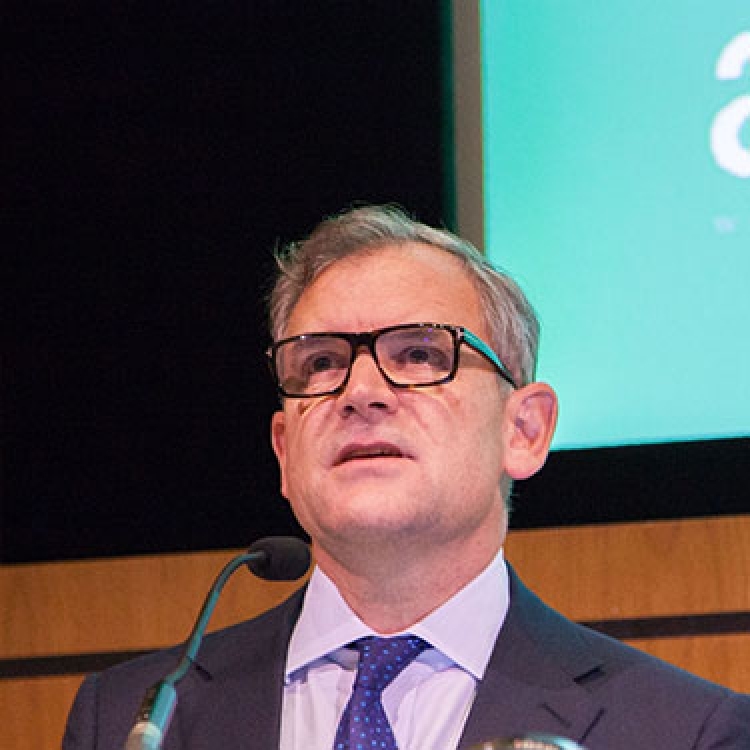Bruce Carnegie-Brown: "Commercial insurance must adapt more quickly to the changing needs of its customers"

Lloyd's chairman says technology, data analytics and efficiency must be at the heart of industry's response
The insurance industry is working hard to close the "innovation gap" but the pace of change needs to accelerate, according to Bruce Carnegie-Brown, chairman of Lloyd's.
Speaking in an interview with Airmic News, he added that making commercial insurance relevant to the changing risk environment has become one of his top priorities as chairman since taking the position in February last year.
"We know that the risk and technological landscape is evolving rapidly - driven by things like climate change, urbanisation, the interconnectedness of the global economy, the shift in company assets from tangible to intangible, and the potentially devastating impact of reputational damage.
"It's also clear that in this complex risk landscape, the commercial insurance sector needs to adapt more quickly to the fast-changing needs of its customers."
"Extraordinary new opportunities"
Technology adoption, better use of data analytics and greater efficiency should be at the heart of the insurance industry's response to these challenges, he said. "These changes are already happening but we need to speed things up."
Better use of digital developments, for example, could "release extraordinary new opportunities" in terms of reducing costs, improving data analytics and enabling more bespoke policies. "A good example of this is the way we use technology today to improve the claims process." If a disaster strikes, he explained, insurers are already using satellites, CCTV and drone photography to build up a picture of losses and help pay claims more quickly.
"Imagine taking this a step further. We could use this data to trigger electronic claims payments automatically. Policyholders with a valid claim wouldn't need to submit anything. This technology exists, what the insurance sector needs to do is to pull it all together to provide a seamless solution for our clients. That's what I'd like to see more of."
Is the commercial insurance sector losing relevance?
In one of his first speeches as chairman - to an audience of senior Airmic members in September last year - he said he was "concerned" about Airmic surveys showing that a large proportion of members saw little role for insurance when managing intangible assets such as reputation.
Asked if the insurance industry is at risk of losing relevance, he said the sector is well aware of the challenge and is making changes:
"I have no issue with Airmic members choosing to retain risk. Where it becomes a problem is if they are retaining risk because they do not think the insurance industry has relevant risk transfer products to offer.
"If that is the case, then the insurance industry is letting down its customers and missing a business opportunity. I think people across the commercial insurance sector understand this challenge and they are responding."
At Lloyd's in particular, he added, there is a strong focus on providing tailor-made risk management solutions that can actually create new business opportunities. Their work on the sharing economy with companies like AirBnB, is one example where the Lloyd's market developed an insurance solution designed to build credibility and trust in their brand.
"We worked closely with them to understand their precise needs and this was critical to providing the bespoke cover they could not get from other insurers."
Driving efficiency
The Lloyd's chairman believes that the industry as a whole needs to do a better job of reducing the time and costs of distributing and underwriting its products. Artificial intelligence has an important role to play: "To that end, I think we are seeing a ramping up of the use of data to drive operational improvements."
Across the London insurance market as a whole, for example, there are a number of modernisation initiatives underway. He mentions Placing Platform Limited (PPL) as an example of one touch data capture which enables brokers, insurers and their processing teams to capture information electronically, making the placing process faster, easier and more accurate.
"Of course there is always more that we must do. But there is no one running a syndicate at Lloyd's who doesn't understand the need to create digital solutions and embrace these opportunities."
"Without insurance, global economic development would be pegged back"
Amid these many challenges facing both underwriters and businesses, Mr Carnegie-Brown believes the insurance sector should do more to shout about the positive effects of insurance, which can often be overlooked.
"I think there is a big opportunity for the insurance sector to do a better job of marketing what it does - which is to help people, businesses, governments and communities rebuild after disasters strike.
"Without insurance, global economic development would be pegged back by the punishing impacts of natural disasters, businesses would crash under the cost of remediating cyber attacks and communities would spend years rebuilding after catastrophes strike."
Take the 2017 hurricane season which saw hurricanes Harvey, Irma and Maria wreak havoc in the Americas. "Nowhere is there a clearer demonstration of the value of insurance than in the recent payment of billions of dollars of claims to help the people of the Caribbean and the US recover."
